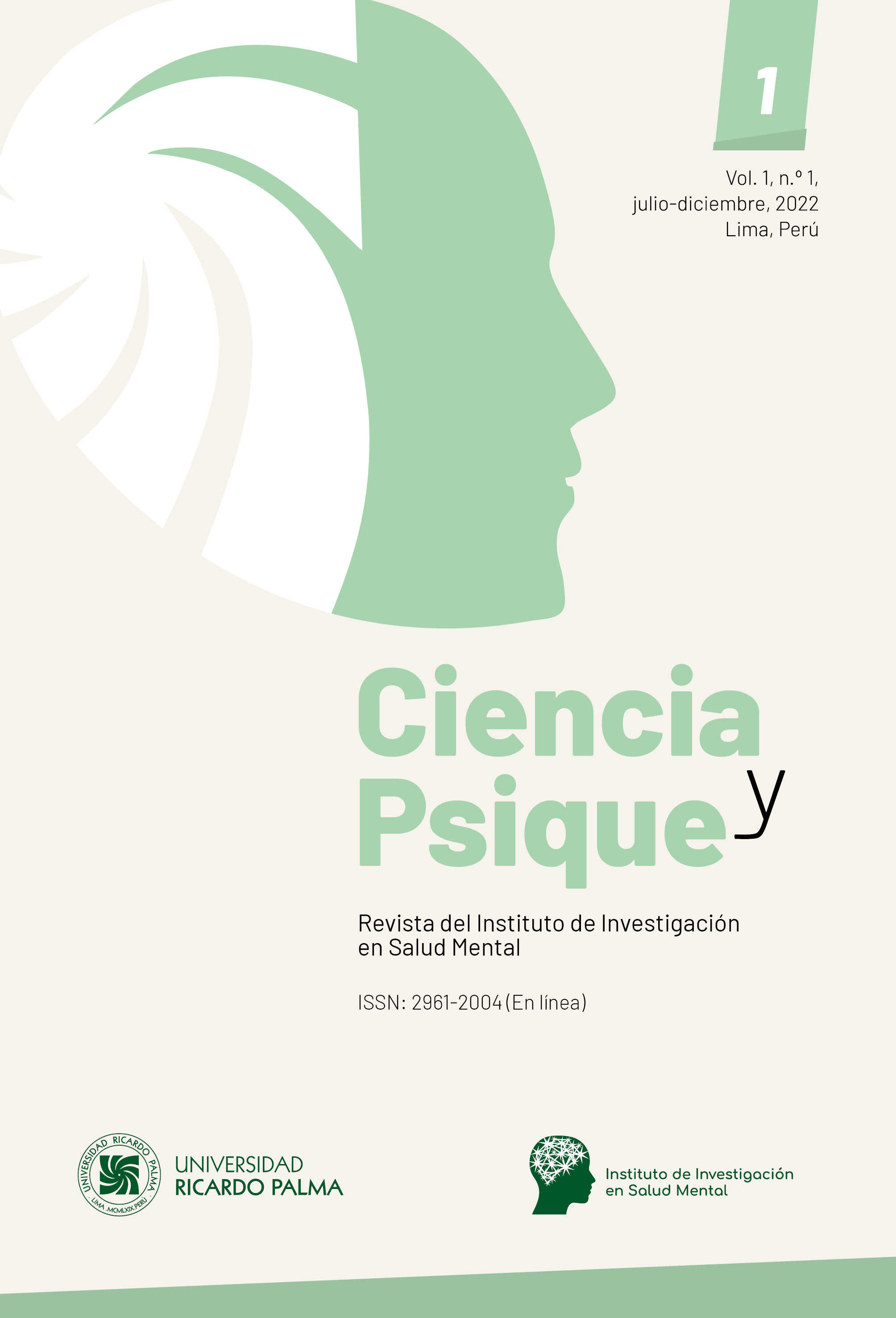Life expectancies, uncertainty and imbalances in psychosocial behavior as indicators of mental health in three different samples of the population of metropolitan Lima, in the context of the Covid-19 pandemic
DOI:
https://doi.org/10.59885/cienciaypsique.v1n1.02Keywords:
life expectancies, uncertainty, behavioral imbalances, samples differentiated by ageAbstract
This is a basic investigation, aimed at identifying the presence of the following variables: life expectancy, uncertainty, and its relationship with six indicators of psychosocial behavior imbalances, in three differentiated samples: young people, adults and older adults, compared to the current situation. of confinement and pandemic by COVID-19. A sample of 349 people residing in Metropolitan Lima and Callao was obtained, to whom the Inventory of Psychosocial Behavior Mismatch 2021 (INDACPS-2021) was applied virtually using a Google questionnaire. In addition to the initial research criteria, which considered samples differentiated by age, the variables sex, educational level, work activity or COVID-19 contagion were also considered. The results made it possible to find differences between the three samples by age, in terms of life expectancy, uncertainty, as well as in the level of behavioral imbalances, considered indicators of mental health of the population.
References
Balluerka, N., Gómez, J., Hidalgo, M., Gorostiaga, A., Espada, P., Padilla, J. y Santed, M. (2020). Las consecuencias psicológicas de la COVID-19 y el confinamiento. https://www.ub.edu/web/ub/ca/menu_eines/noticies/docs/Consecuencias_
psicologicas_COVID-19.pdf
Buhr, K. y Dugas, M. (2002). The intolerance of uncertainty scale: psychometric properties of the english versión. Behaviour Research Therapy, 40(8), 931-945. https://doi.org/10.1016/s0005-7967(01)00092-4
Clarke, E. y Kiropoulos, L. (2021). Mediating the relationship between neuroticism and depressive, anxiety and eating disorder symptoms: The role intolerance of uncertainty and cognitive flexibility. Journal of Affective Disorders Reports, 4, 1-8. https://doi.org/10.1016/j.jadr.2021.100101
Codagnone, C., Bogliacino, F., Gómez, C., Folkvord, F., Liva, G., Charris, R., Montealegre, F., Lupiañez, F. y Veltri, G. (2021). Restarting “Normal” Life after Covid-19 and the Lockdown: Evidence from Spain, the United Kingdom, and Italy. Social Indicators Research, 158(1), 241-265. http://dx.doi.org/10.1007/s11205-021-02697-5
Frager, R. (1991). Prólogo. En Maslow, A. H., Motivación y personalidad de Maslow. Ediciones Díaz de Santos.
Freeston, M. H., Rhéaume, J., Letarte, H., Dugas, M. J. y Ladouceur, R. (1994). Personality and Individual Differences, 17(6), 791-802. https://doi.org/10.1016/0191-8869(94)90048-5
González, M., Cubas, R., Rovella, A. y Darias, M. (2006). Adaptación española de la escala de intolerancia hacia la incertidumbre: procesos cognitivos, ansiedad y depresión. Psicología y salud, 16(2), 219-233. https://www.redalyc.org/pdf/291/29116211.pdf
Gil, F., Urchaga, J. y Sánchez, A. (2020). Percepciones y expectativas en el alumnado universitario a partir de la adaptación a la enseñanza no presencial motivada por la pandemia de COVID-19. Revista Latina de Comunicación Social, 78, 65-85. https://doi.org/10.4185/RLCS-2020-1470
Gu, Y., Gu, S., Lei, Y. y Li, H. (2020). From uncertainty to anxiety: how uncertainty fuels anxiety in a process mediated by intolerance of uncertainty. Neural Plasticity, 2020, 1-8. https://doi.org/10.1155/2020/8866386
Herrera, D. y Matos, L. (2013). Desarrollo del concepto de motivación y su representación en distintas aproximaciones teóricas. En Herrera, D. (Ed.), Teorías contemporáneas de la motivación: una perspectiva aplicada. Fondo Editorial de la Pontificia Universidad Católica del Perú.
Karataş, Z. y Tagay, Ö. (2021). The relationships between resilience of the adults affected by the covid pandemic in Turkey and Covid-19 fear, meaning in life, life satisfaction, intolerance of uncertainty and hope. Personality and Individual Differences, 172, 1-12. https://doi.org/10.1016/j.paid.2020.110592
Maslow, A. H. (1991). Motivación y personalidad. Ediciones Díaz de Santos.
Palmero, F., Gómez, C. y Guerrero, C. (2016). Manual de prácticas de motivación y emoción. Universitat Jaume I.
Rodríguez, A., Rubio, S. y Diaz, E. (2021). Influence of the CoViD-19 Pandemic on Mental Workload and Burnout of Fashion Retailing Workers in Spain. International Journal of Environmental Research and Public Health, 18(3). https://doi.org/10.3390/ijerph18030983
Ruiz, L. (2021). La teoría de expectativa-valor de Atkinson: qué es y qué propone. Psicología y Mente. https://psicologiaymente.com/psicologia/teoria-expectativa-valor-atkinson
Sánchez, H. H., Reyes, C. y Matos, P. (2020a). Comportamientos psicosociales desajustados, como indicadores de salud mental de la población peruana, en el contexto de la presencia del COVID-19. https://repositorioslatinoamericanos.uchile.cl/handle/2250/3353156
Sánchez, H., Reyes, C. y Matos, P. (2020b). Impacto de la presencia del covid-19 en las actitudes y comportamientos psicosociales de la población peruana. https://repositorio.urp.edu.pe/handle/20.500.14138/3030
Sánchez, H., Reyes, C. y Matos, P. (2021). Validez y confiabilidad del Inventario de Comportamiento Psicosocial Desajustado, INDACPSSRM-2021, en el contexto de la pandemia por COVID-19 en la población de Lima [En prensa].
Sánchez, H., Reyes, C. y Matos, P. (2022). Comportamientos psicosociales desajustados, como indicadores de salud mental de la población peruana, en el contexto de la presencia del COVID-19. https://repositorioslatinoamericanos.uchile.cl/handle/2250/3353156
Sandín, B., Valiente, R., García-Escalera, J. y Chorot, P. (2021). Impacto psicológico de la pandemia de COVID-19: Efectos negativos y positivos en población española asociados al periodo de confinamiento nacional. Revista de Psicopatología y Psicología Clínica, 25(1), 1-22. https://doi.org/10.5944/rppc.27569
Sandoval, C. (2018). Desajuste del comportamiento psicosocial en estudiantes del IV y V ciclos de educación primaria en una institución educativa estatal, Lambayeque [Tesis de licenciatura, Universidad Católica Santo Toribio de Mogrovejo].
Sundarasen, S., Chinna, K., Kamaludin, K., Nurunnabi, M., Baloch, G., Bakr, H., Abid, S. y Sukayt, A. (2020). Psychological Impact of COVID-19 and Lockdown among University Students in Malaysia: Implications and Policy Recommendations. International Journal of Environmental Research and Public Health, 17(17). https://doi.org/10.3390/ijerph17176206
Valle, M. del, Zamora, E., Andrés, M., Irurtia, M. y Urquijo, S. (2020). Dificultades de regulación emocional e intolerancia a la incertidumbre en estudiantes universitarios. Quadernos de Psicología, 22(2), 1-13. https://doi.org/10.5565/rev/qpsicologia.1594
Downloads
Published
How to Cite
Issue
Section
License
Copyright (c) 2022 Ciencia y Psique

This work is licensed under a Creative Commons Attribution 4.0 International License.




